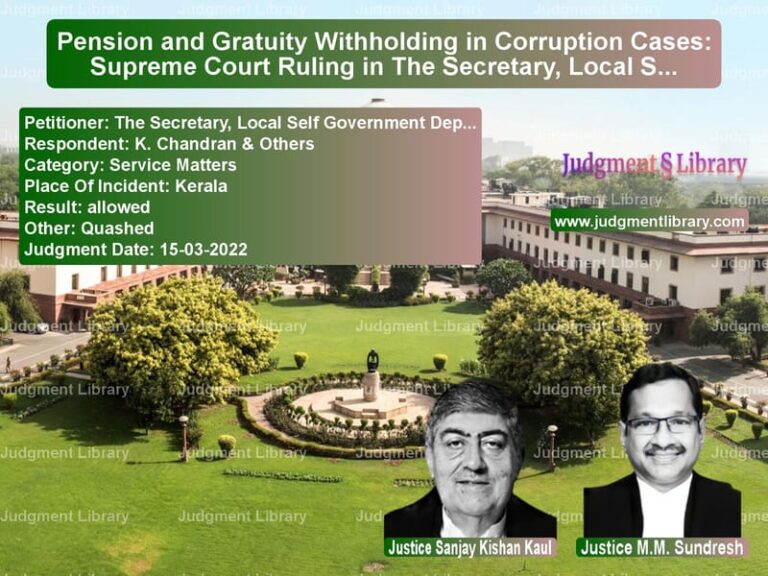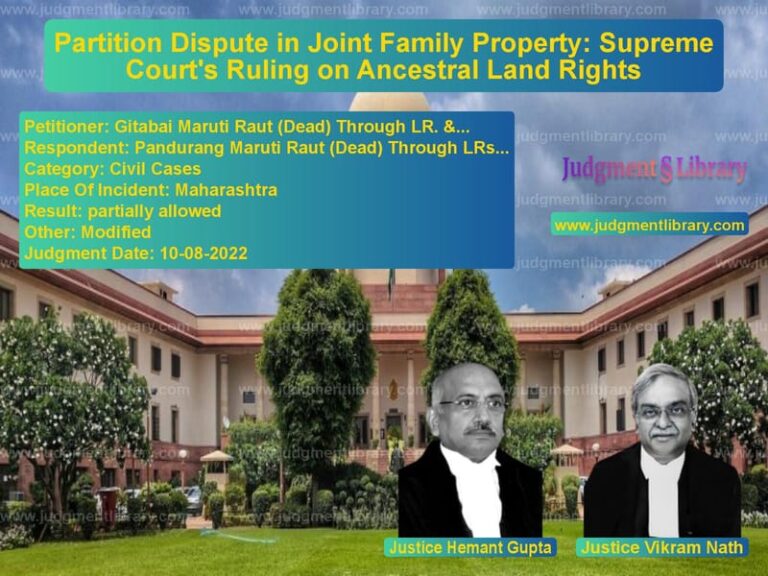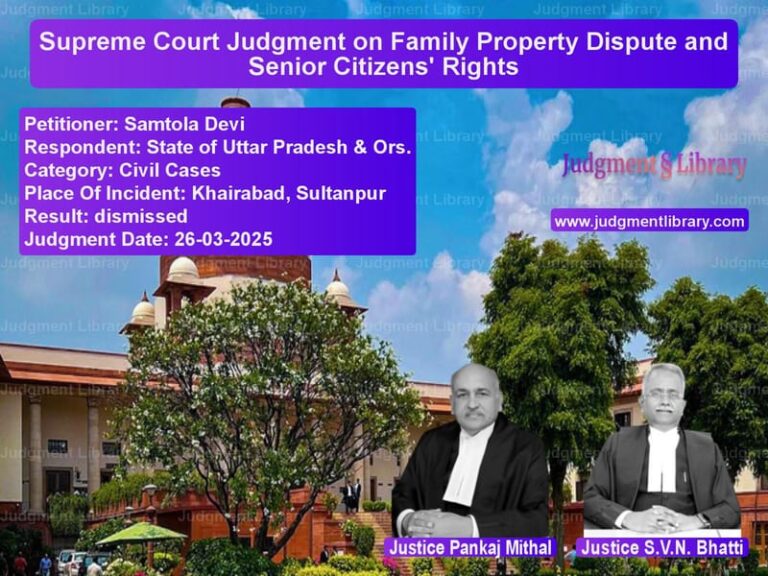Calcutta Club vs. State of West Bengal: Supreme Court Examines Taxability of Club Transactions
The case of State of West Bengal & Others vs. Calcutta Club Limited revolves around the applicability of sales tax on supplies made by an incorporated club to its permanent members. The Supreme Court had to determine whether transactions between clubs and their members amount to ‘sales’ under the West Bengal Sales Tax Act, 1994, considering the doctrine of mutuality and the impact of the 46th Constitutional Amendment.
Background of the Case
The issue arose when the Assistant Commissioner of Commercial Taxes issued a notice to Calcutta Club Limited for not paying sales tax on food and drinks supplied to its permanent members. The club challenged the tax demand before the West Bengal Taxation Tribunal, arguing that no sale occurs between a club and its members due to the principle of mutuality.
The Tribunal ruled in favor of the club, holding that transactions between a club and its permanent members do not constitute a sale. The West Bengal government appealed to the Calcutta High Court, which upheld the Tribunal’s decision, prompting the state to approach the Supreme Court.
Legal Issues Raised
The case raised several significant legal questions:
- Does the supply of goods (such as food and beverages) by a members-only club to its permanent members qualify as a ‘sale’ under sales tax laws?
- How does the doctrine of mutuality impact the taxation of club transactions?
- What is the effect of the 46th Constitutional Amendment on the principle of mutuality?
- Can an incorporated club be considered separate from its members for taxation purposes?
Arguments of the Petitioner (State of West Bengal)
The West Bengal government, through its counsel, argued:
- The 46th Constitutional Amendment introduced Article 366(29A), which deems certain transactions as ‘sales’ for taxation purposes.
- Under Article 366(29A)(e) and (f), sales tax applies to the supply of goods by an unincorporated association or body of persons to its members.
- The club acts as a distinct legal entity, separate from its members, and therefore, transactions between them should be taxable.
- The club raises invoices for its members, which demonstrates a commercial transaction akin to a sale.
Arguments of the Respondent (Calcutta Club Limited)
The club’s counsel countered:
- The principle of mutuality applies, meaning the club and its members are the same entity, so no sale occurs.
- The doctrine of mutuality has been upheld in previous Supreme Court cases, including Young Men’s Indian Association (1970) and Bankipur Club (1997).
- The 46th Amendment does not explicitly override the principle of mutuality in incorporated clubs.
- The club merely acts as an agent of its members in procuring goods and services, not as a seller.
Supreme Court’s Observations
The Supreme Court carefully examined the provisions of the Constitution, sales tax laws, and previous judicial precedents. The key observations included:
- “The doctrine of mutuality is well established in Indian jurisprudence, and the question is whether the 46th Amendment overrides it in this case.”
- “The mere presence of an invoice does not necessarily imply a sale; the nature of the transaction must be examined.”
- “If a club acts as an agent of its members, then supplies made to members do not constitute a sale.”
Key Extracts from the Judgment
The Supreme Court framed three critical questions for a larger bench:
1. Whether the doctrine of mutuality is still applicable to incorporated clubs after the 46th Amendment to Article 366(29A) of the Constitution?
2. Whether the ruling in Young Men’s Indian Association (1970) still holds post-46th Amendment?
3. Whether the 46th Amendment deems food and beverage supplies by clubs to be sales, making them liable to sales tax?
The Supreme Court emphasized:
“The concept of mutuality is based on the principle that an entity cannot trade with itself. If a club is merely an extension of its members, there is no sale, and taxation may not be justified.”
Final Judgment
The Supreme Court referred the matter to a larger bench for a definitive ruling on the interplay between the doctrine of mutuality and the 46th Constitutional Amendment. The Court acknowledged that the issue had broad implications for clubs, societies, and associations across India.
Impact of the Judgment
The case has significant consequences:
- It will determine whether incorporated clubs must pay sales tax on transactions with their members.
- It could set a precedent for taxation of other membership-based organizations.
- It may lead to legislative changes clarifying the tax treatment of club transactions.
Conclusion
The Supreme Court’s decision to refer the case to a larger bench underscores the complexity and importance of the issue. The ruling will clarify whether sales tax applies to clubs under the principle of mutuality or if the 46th Amendment mandates taxation. The outcome will have far-reaching implications for clubs and associations across India.
Don’t miss out on the full details! Download the complete judgment in PDF format below and gain valuable insights instantly!
Download Judgment: State of West Bengal vs Calcutta Club Limite Supreme Court of India Judgment Dated 04-05-2016-1741860994369.pdf
Direct Downlaod Judgment: Direct downlaod this Judgment
See all petitions in Tax Evasion Cases
See all petitions in GST Law
See all petitions in Income Tax Disputes
See all petitions in Judgment by Dipak Misra
See all petitions in Judgment by Shiva Kirti Singh
See all petitions in Remanded
See all petitions in Referred to Larger Bench
See all petitions in supreme court of India judgments May 2016
See all petitions in 2016 judgments
See all posts in Taxation and Financial Cases Category
See all allowed petitions in Taxation and Financial Cases Category
See all Dismissed petitions in Taxation and Financial Cases Category
See all partially allowed petitions in Taxation and Financial Cases Category







